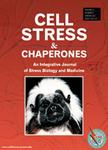版权所有:内蒙古大学图书馆 技术提供:维普资讯• 智图
内蒙古自治区呼和浩特市赛罕区大学西街235号 邮编: 010021

作者机构:Queens Univ Dept Biochem Kingston ON K7L 3N6 Canada
出 版 物:《CELL STRESS & CHAPERONES》 (细胞应激与侣伴蛋白)
年 卷 期:1999年第4卷第4期
页 面:205-210页
核心收录:
学科分类:0710[理学-生物学] 07[理学] 071009[理学-细胞生物学] 09[农学] 0901[农学-作物学] 090102[农学-作物遗传育种]
主 题:抗原 肿瘤/代谢 胞质溶胶/代谢 进化 分子 基因表达调控 肿瘤 热休克蛋白质类/代谢 免疫疗法 肿瘤/免疫学 RNA/代谢 受体 抗原 T细胞/代谢 T淋巴细胞 细胞毒性/代谢 人类
摘 要:Organisms tune to their environment through adaptations which confer a selective advantage. However, in complex systems, a primary change of positive adaptive value might have multiple minor secondary effects, usually of negative adaptive value, which could invoke further counter-adaptations. This fine-tuning , a debugging , mainly at the intracellular level, would appear an evolutionary burden detracting from the positive nature of the primary change. However, if the primary mutation is in a potential oncogene, secondary, short-term effects may include the recruitment, in an apparently random manner, of unmutated non-oncogene products into the antigenic repertoire of the cancer cell. This danger signal, provided by the co-aggregation of oncogene and non-oncogene products, would be mediated by inducible heat-shock proteins (Hsps), and lead to display of corresponding MHC-peptide complexes. It was argued previously that T cells specific for peptides from most self intracellular antigens are not eliminated during T cell education , and so would be available for subsequent immune activation by the corresponding peptides. These considerations might explain why cancer specific antigens have been so elusive, why cancer antigenicity is often individual specific, and why therapeutic approaches involving complexes of peptides with Hsps may be successful. (C) 1999 Harcourt Publishers Ltd.